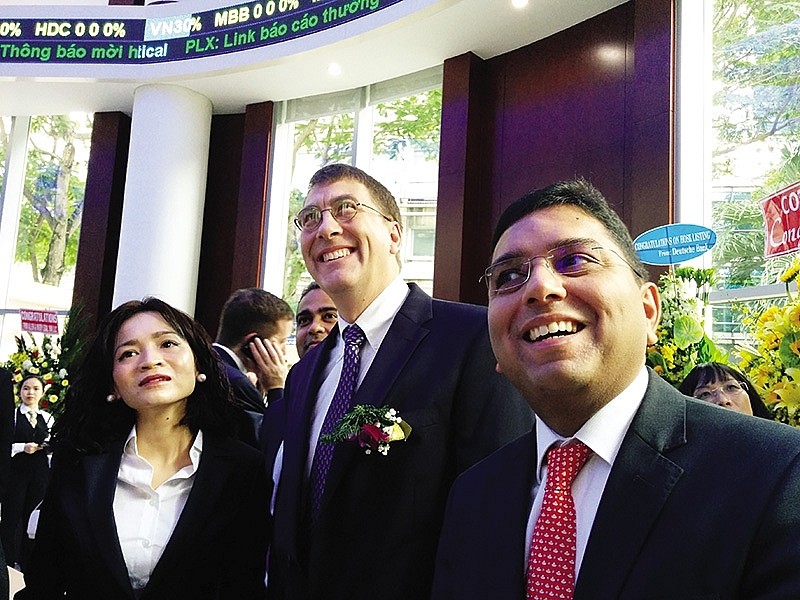Investors keep faith despite trade war
 |
| Foreign investors remain optimistic about Vietnam’s stable macro-economics and growing stock market, Photo: Le Toan |
For the past few months, Vietnam’s stock market has been through a corrective period, which sent the VN-Index down by 20 per cent from its March peak at 1,170 points. The market recovered in August, only to enter September with fresh concerns as emerging markets floundered left and right.
Specifically, in the first week of September, US-China trade tensions escalated once again, with the possibility of new tariffs on $267 billion worth of US imports from China. Emerging markets around the world are already feeling the heat: Capital outflows have been recorded from Thailand, Indonesia, and the Philippines, while Turkey and Argentina entered economic recessions and saw their currencies plummet.
Some observers fear that these woes may soon spread to Vietnam. It is notable that the US and China are the top two trading partners of the export-oriented Vietnam, so any rising conflicts between the two superpowers may negatively affect Vietnam’s capital inflows, stocks, and foreign exchange rates.
However, investors and analysts firmly believe that Vietnam will be spared from contagion. They said that Vietnam is different from other troubled markets. They cited Vietnam’s stable macro-economics, including the 7-per-cent GDP growth in the first half of 2018, less than 4 per cent inflation, and 15-per-cent export growth. The VND has also been devalued by less than 2 per cent, which is in line with the State Bank of Vietnam’s policies and ranks it among the most stable Asian currencies.
Analysts also pointed out that unlike other troubled markets, Vietnam’s foreign debt is mostly preferential long-term loans from the likes of the World Bank, the Japan International Cooperation Agency or the Asian Development Bank. These debts, denominated in USD, euro, and yen, have a fixed interest rate and a longer repayment period. Vietnam’s foreign reserves, currently at a historic high of $64 billion, can also absorb foreign exchange volatilities and short-term foreign loans.
Most investors are now turning away from external factors to focus on the profitability of Vietnamese companies. According to research by PYN Elite Fund, listed companies’ profit for the first half of 2018 grew by 29 per cent year-on-year. The stock exchanges currently list 792 businesses and are slated to welcome more as the market recovers.
| Vu Minh Duc, Senior research manager, Viet Capital Securities
Foreigners’ net selling on Vietnam’s stock market is indeed part of a broader trend in emerging markets. However, data shows that in the first eight months of 2018, foreign investors net bought VND32.4 trillion ($1.43 billion) worth of Vietnamese equities, while they trimmed down their portfolios in the Philippines, Indonesia, and Thailand. In foreign investors’ eyes, Vietnam has its own appeal in terms of increasing openness to the global economy, the prospects of an upgrade to the emerging market status, and the larger size of the market overall. The US Federal Reserve may hike rates again this year and the US-China trade war may worsen, but I think any net selling in Vietnam will decrease as 2018 comes to an end. I believe that with the bright prospects of Vietnam’s economy and the stock market from now until 2020, Vietnam can retain and attract more long-term investors. Short-term capital may flow in via exchange-traded funds or P-Notes, but these kind of inflows are highly volatile and susceptible to global tensions. Mattias Martinsson, Chief investment officer, Tundra Vietnam Fund
Our Tundra Vietnam Fund grew by 8.4 per cent in August, outperforming the benchmark VN-Index. The fund has a tilt towards mid-caps and structural growth stories that are likely to benefit from Vietnam’s economic growth and consumerism. On the whole, in August, foreigners remained net sellers in Vietnam to the tune of $71.6 million. An analysis of foreign flows offers a comforting perspective, as the main sell-off came from Vingroup stocks (Vincom, Vinhomes, and Vincom Retail) with a total value of $126 million. This means that foreigners were net buyers otherwise. The latest macro-economic numbers of Vietnam continue to signal positive momentum as geopolitical risks seem to be at bay. The VND stabilised, foreign direct investment continues to grow, and inflation in August inched up by 3.98 per cent year-on-year. In August, Vietnam’s State Securities Commission also mentioned that the government would do its best, in terms of policy making, to help Vietnam secure a place in the MSCI Emerging Market Index within two years. Nguyen Duc Hung Linh, Head of Retail Research, Saigon Securities Incorporation
The US-China trade war is unlikely to end anytime soon. Because these nations are among Vietnam’s biggest trading partners, we should prepare ourselves. Foreign investors may feel inclined to withdraw from emerging markets with higher risks and return to the US. Four upcoming rate hikes by the Federal Reserve may also be a reason. Of course, trade wars and capital outflow trends bring challenges, but they can also become an opportunity for Vietnam to restructure its economy and grow stronger. We believe that the most viable solution is to boost Vietnam’s domestic demand and supply, strengthening its internal power. This includes maintaining strong economic growth, restructuring state-owned enterprises, and increasing high-quality supply to the stock market. A market upgrade is also advisable to retain Vietnam’s appeal to foreign investors. As Vietnam needs to compete against hundreds of other markets around the world, promoting itself as an investment destination may also need a concerted effort by the government, companies, brokerages, and other stakeholders. Petri Deryng - Portfolio manager, PYN Elite Fund
A strong USD raises the dollar-denominated liabilities of many indebted countries, and USD interest rates have been rising in addition to a deepening trade war. However, in Vietnam, the overall risk is reasonably manageable, unlike in other countries which are more at risk due to their vulnerability to constant current account deficits, such as Turkey. Due to strong economic growth, Vietnam’s foreign debt ratio is still below 50 per cent of GDP. Many of Vietnam’s long-term loans are not market-based. Instead, they are tied to bilateral projects with fixed low interest rates and are not always denominated in USD. At the same time, Vietnam’s current account has been in surplus, and foreign exchange reserves have risen five-fold over six years. Vietnamese exports are growing and the outlook for listed companies is good. The fundamentals of the economy are stable and the growth prospects are excellent. As external threats are removed, the Vietnamese stock market could resume its rising trend. |
What the stars mean:
★ Poor ★ ★ Promising ★★★ Good ★★★★ Very good ★★★★★ Exceptional
Related Contents
Latest News
More News
- Foreign leaders extend congratulations to Party General Secretary To Lam (January 25, 2026 | 10:01)
- 14th National Party Congress wraps up with success (January 25, 2026 | 09:49)
- Congratulations from VFF Central Committee's int’l partners to 14th National Party Congress (January 25, 2026 | 09:46)
- 14th Party Central Committee unanimously elects To Lam as General Secretary (January 23, 2026 | 16:22)
- Worldwide congratulations underscore confidence in Vietnam’s 14th Party Congress (January 23, 2026 | 09:02)
- Political parties, organisations, int’l friends send congratulations to 14th National Party Congress (January 22, 2026 | 09:33)
- Press release on second working day of 14th National Party Congress (January 22, 2026 | 09:19)
- 14th National Party Congress: Japanese media highlight Vietnam’s growth targets (January 21, 2026 | 09:46)
- 14th National Party Congress: Driving force for Vietnam to continue renewal, innovation, breakthroughs (January 21, 2026 | 09:42)
- Vietnam remains spiritual support for progressive forces: Colombian party leader (January 21, 2026 | 08:00)





 Tag:
Tag:




















 Mobile Version
Mobile Version